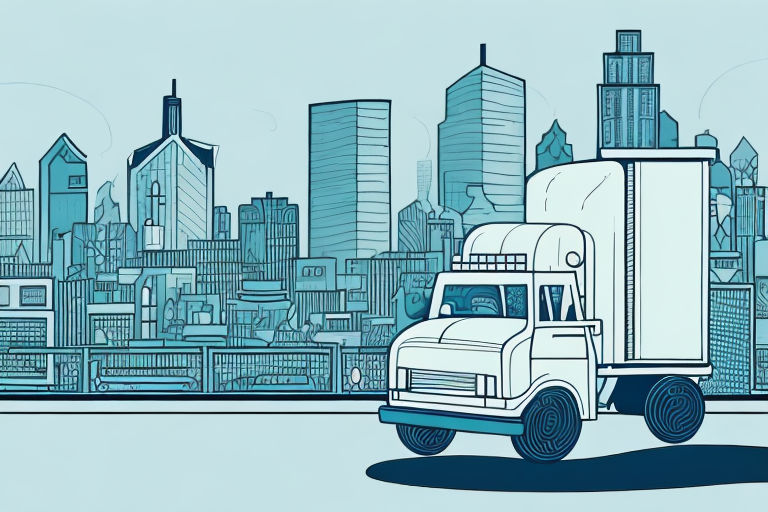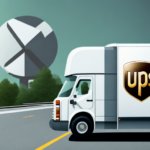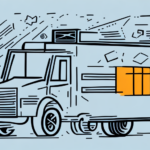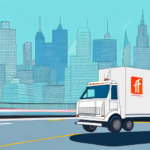Discover the Top Last Mile Delivery Service Companies
If you're running a small or large e-commerce business or managing a logistics company that needs to handle the final mile of delivery, it can be challenging, but it doesn't have to be. In this article, we'll provide an in-depth analysis of everything you need to know about last mile delivery services. Let’s start with the basics:
What is Last Mile Delivery Service?
Last mile delivery is the final step of the delivery process, where the item or package is transported from a transportation hub to the final destination, typically the customer's doorstep. It’s a critical aspect of the delivery process because the delivery experience significantly impacts the customer’s perception of the company.
The primary goal of last mile delivery is to get the item from the distribution center to the customer as quickly, efficiently, and cost-effectively as possible. In 2023, advancements in technology have further emphasized the importance of optimizing this stage to enhance customer satisfaction and operational efficiency.
Challenges in Last Mile Delivery
One of the biggest challenges of last mile delivery is the unpredictability of the final destination. Unlike transportation hubs, final destinations can be located in areas with limited access, such as rural locations or high-rise buildings, making it difficult for delivery drivers to locate the exact address and deliver the package on time.
To overcome these challenges, companies are exploring new technologies, such as:
- Drones: Autonomous aerial vehicles that can deliver packages quickly, especially in hard-to-reach areas.
- Autonomous Vehicles: Self-driving cars and robots that can navigate urban environments to deliver packages without human intervention.
- Advanced Routing Software: Platforms that optimize delivery routes in real-time based on traffic, weather, and delivery priorities.
These innovations aim to make last mile delivery more efficient, reliable, and scalable to meet the growing demands of the e-commerce sector.
Why is Last Mile Delivery Service Important?
Excellent customer service is paramount in the e-commerce industry, and last mile delivery service is essential for providing that. The final step of the delivery journey can make or break the customer’s satisfaction with both the product and the company.
Customer Satisfaction
The vast majority of customers expect a seamless delivery experience, including options such as same-day or scheduled deliveries. According to a 2023 report by McKinsey, 75% of customers consider delivery speed a key factor when choosing an online retailer.
Last mile delivery service providers enable businesses to meet these expectations by offering various delivery options that cater to different customer needs.
Environmental Impact
Last mile delivery service providers also play a crucial role in reducing the carbon footprint of the e-commerce industry. By optimizing delivery routes and adopting eco-friendly vehicles, companies can significantly mitigate the environmental impact of their delivery processes.
According to the Environmental Protection Agency (EPA), optimizing delivery routes can reduce vehicle emissions by up to 30%, contributing to more sustainable business practices.
Cost Efficiency
Additionally, last mile delivery service providers help e-commerce businesses save time and money by handling the logistics of the delivery process. Outsourcing last mile delivery allows businesses to focus on their core operations, enhancing overall efficiency and profitability.
Top Challenges in Last Mile Delivery Service
Several challenges are associated with last mile delivery, stemming from customer expectations, environmental factors, delivery logistics, and more.
Customer Expectations
Customers continually seek better service options, narrower delivery windows, and consistent reliability. Meeting these high expectations requires robust logistics and adaptive delivery strategies.
Environmental Factors
Unpredictable traffic, adverse weather conditions, and complex routing issues often impact last mile delivery services, making it difficult to ensure punctual deliveries.
Package Theft
With the surge in online shopping, package theft has become a prevalent problem, leading to financial losses for customers and damaging the reputation of delivery service providers. To address this, delivery companies are implementing secure delivery options, such as locker systems, signature confirmation, and real-time package tracking.
Sustainability
The increasing number of delivery vehicles on the road contributes to air pollution and traffic congestion. To mitigate this, many companies are adopting eco-friendly delivery modes, including electric vehicles (EVs), bicycles, and drones. These sustainable delivery options not only reduce the carbon footprint but also offer cost savings in the long run.
How to Choose the Right Last Mile Delivery Service Company
Choosing the right last mile delivery service provider is crucial for ensuring a successful delivery experience. Beyond cost, consider factors such as technology, infrastructure, delivery options, tracking capabilities, and customer service.
Key Factors to Consider
- Technology and Infrastructure: Ensure the provider uses advanced technology for route optimization, real-time tracking, and efficient logistics management.
- Delivery Options: Look for providers that offer flexible delivery options such as same-day, next-day, and scheduled deliveries.
- Tracking and Reporting: Robust tracking systems that provide real-time updates and comprehensive reporting are essential for transparency and customer satisfaction.
- Customer Service: Responsive and reliable customer support can significantly enhance the overall delivery experience.
Experience and Reputation
Evaluate the provider’s experience and reputation in the industry. Look for a company with a proven track record of timely deliveries and minimal issues. Online reviews, ratings, and case studies can offer insights into the company's performance and customer satisfaction levels.
Coverage Area
Ensure the delivery service covers all the locations you need. A provider with a broad coverage area can handle deliveries to various regions, both urban and rural, effectively.
Cost vs. Value
While cost is a significant factor, it's essential to consider the value you're receiving. A more expensive provider might offer better reliability, faster delivery times, and superior customer service, which can translate into higher customer satisfaction and retention.
Top 10 Last Mile Delivery Service Companies for Small Businesses
For small businesses, selecting the right last mile delivery service provider can be the difference between a thriving and struggling e-commerce operation. Here are the top 10 last mile delivery service providers tailored for small businesses:
- UPS
- USPS
- FedEx
- DHL
- Amazon Logistics
- Deliv
- Postmates
- DoorDash
- ShipBob
- Rakuten Super Logistics
When choosing a last mile delivery service provider, consider factors such as:
- Delivery Speed: The ability to offer same-day or next-day delivery options.
- Reliability: Consistent on-time deliveries and minimal issues.
- Cost: Competitive pricing without compromising service quality.
- Customer Service: Responsive support to handle any delivery-related queries or issues.
- Specialization: Some providers may specialize in specific types of products or industries.
Additionally, consider the level of customer service and support offered by the provider, as well as any additional features or tools that can streamline the delivery process. By carefully evaluating these factors, small businesses can identify a delivery service provider that aligns with their unique needs and supports the growth of their e-commerce operations.
Best Last Mile Delivery Service Companies for E-commerce Businesses
For e-commerce businesses, selecting a delivery partner that understands the unique needs of online retailers is essential. Here are the best last mile delivery service providers for e-commerce businesses:
- UPS
- FedEx
- DHL
- OnTrac
- LaserShip
- ShipBob
- Rakuten Super Logistics
- Stamps.com
- ShipStation
When selecting a last mile delivery service provider, consider factors such as:
- Delivery Speed: Providers offering same-day or next-day delivery options can enhance customer satisfaction.
- Cost: Balance delivery speed and reliability with cost to maintain profitability.
- Customer Service: High-quality customer support can resolve issues swiftly, improving the overall customer experience.
- Real-Time Tracking: Providers offering real-time tracking and delivery notifications can enhance transparency and customer trust.
Additionally, evaluate your business’s specific needs, such as the type of products you sell, your primary customer base, and geographic coverage required. By aligning these needs with the capabilities of the delivery provider, you can ensure a seamless and efficient delivery process that fosters customer loyalty and drives business growth.
How Technology is Revolutionizing Last Mile Delivery Services
The integration of cutting-edge technology is rapidly transforming last mile delivery services. Innovations such as drone technology, the Internet of Things (IoT), and artificial intelligence (AI) are making the delivery process more streamlined and efficient.
Artificial Intelligence (AI)
AI-powered algorithms can optimize delivery routes, predict traffic patterns, and anticipate potential delays. This not only saves time and money but also reduces the carbon footprint of delivery vehicles. According to a 2023 report by Deloitte, AI can improve delivery efficiency by up to 20%.
Blockchain Technology
Blockchain technology is being explored to enhance transparency and security in last mile deliveries. By creating a secure and immutable ledger of all transactions, blockchain can prevent fraud and ensure that packages are delivered to the correct recipients. Additionally, blockchain can reduce the reliance on intermediaries, streamlining the delivery process further.
Internet of Things (IoT)
IoT devices, such as smart sensors and connected vehicles, provide real-time data that can be used to monitor delivery status, track package locations, and manage inventory efficiently. This interconnectedness facilitates better coordination and communication between different parts of the delivery chain.
Drones and Autonomous Vehicles
Drones and autonomous vehicles are revolutionizing last mile deliveries by enabling faster and more flexible delivery options. Companies like Amazon and UPS have been trialing drone delivery services, which can reduce delivery times and costs while operating with minimal environmental impact.
The Future of Last Mile Delivery Services
The future of last mile delivery services is poised for significant advancements, with an emphasis on automation, sustainability, and continuous innovation. These developments aim to make delivery processes more reliable, efficient, and environmentally friendly.
Automation and Robotics
Automation and robotics will continue to play a pivotal role in last mile delivery. From automated sorting facilities to robotic delivery assistants, these technologies can enhance operational efficiency and reduce the need for human intervention, thereby lowering costs and minimizing errors.
Sustainability Initiatives
With growing concerns about climate change and environmental sustainability, many businesses are prioritizing eco-friendly delivery methods. The adoption of electric vehicles (EVs), bicycles, and other low-emission transport options contributes to reducing the overall carbon footprint of last mile deliveries.
Moreover, companies are exploring sustainable packaging solutions to further minimize environmental impact. According to the World Economic Forum, sustainable last mile delivery practices can reduce greenhouse gas emissions by 15-20%.
Drones and Autonomous Vehicles
The use of drones and autonomous vehicles is expected to expand, offering innovative delivery solutions that can handle high-demand periods efficiently. These technologies not only reduce delivery times but also offer scalability to meet the increasing demands of e-commerce businesses.
Integration of Advanced Data Analytics
Advanced data analytics will empower businesses to make informed decisions regarding delivery logistics. By analyzing large sets of data, companies can predict demand patterns, optimize inventory management, and enhance route planning, leading to more efficient last mile delivery services.
Tips to Optimize Your Last Mile Delivery Experience
Optimizing your last mile delivery experience involves implementing strategies that enhance efficiency, customer satisfaction, and cost-effectiveness. Here are some actionable tips:
- Offer Flexible Delivery Options: Provide customers with multiple delivery choices, such as same-day, next-day, or scheduled deliveries to cater to their preferences and increase satisfaction.
- Invest in Advanced Technology: Utilize real-time tracking systems, route optimization software, and automated reporting tools to streamline your delivery operations and improve transparency.
- Enhance Communication: Maintain open lines of communication with both drivers and customers. Real-time updates and proactive notifications can keep customers informed and reduce delivery-related inquiries.
- Prioritize Customer Satisfaction: Implement personalized delivery options, ensure your delivery team is well-trained, and address any issues promptly to build a loyal customer base.
Another crucial aspect is the use of data-driven decision making. Analyze delivery data to identify bottlenecks, understand customer preferences, and continuously improve your delivery processes. By prioritizing customer satisfaction and operational efficiency, you can significantly enhance your last mile delivery experience.
Cost Comparison of Last Mile Delivery Services
The costs associated with last mile delivery can vary significantly depending on several factors, including delivery speed, distance, package size, and the level of service required. It’s essential to compare prices from multiple service providers to find the most cost-effective delivery option for your business.
Key factors influencing costs include:
- Delivery Speed: Faster delivery options, such as same-day delivery, typically incur higher costs compared to standard delivery options.
- Distance: The distance between the distribution center and the final destination affects fuel costs and labor expenses.
- Package Size and Weight: Heavier and larger packages may require more resources to deliver, increasing the cost.
- Service Level: Additional services like real-time tracking, insurance, and special handling can add to the overall cost.
To manage costs effectively, businesses can:
- Negotiate bulk shipping rates with delivery providers.
- Implement route optimization to reduce fuel and labor costs.
- Utilize data analytics to forecast demand and plan deliveries efficiently.
Customer Reviews and Feedback on Top Last Mile Delivery Services
Reading customer reviews and feedback is essential before selecting a last mile delivery service provider. Here are some customer reviews and feedback on the top last mile delivery service providers:
- UPS: “Prompt and efficient delivery service, with a wide range of options to choose from.”
- USPS: “Reliable and cost-effective delivery service for small businesses and individuals.”
- FedEx: “Excellent customer service and fast delivery options, with competitive pricing.”
- DHL: “Global reach and dependable delivery, though sometimes pricier than competitors.”
- Amazon Logistics: “Seamless integration with Amazon orders and quick delivery times.”
- ShipBob: “Great for small businesses, with easy integration and reliable service.”
- Rakuten Super Logistics: “Efficient and scalable solutions for growing e-commerce businesses.”
Customer reviews highlight the importance of reliability, speed, and customer service in last mile delivery. It's advisable to read multiple reviews and possibly conduct a trial with the provider to assess their service quality firsthand.
Sustainability and Environmental Impact of Last Mile Delivery Services
The environmental impact of last mile delivery services is an increasingly important issue for businesses and consumers alike. Many companies are adopting sustainable practices to minimize their carbon footprint and contribute to environmental conservation.
Adoption of Eco-Friendly Vehicles
Companies are investing in electric and hybrid vehicles to reduce emissions from delivery vehicles. Electric delivery vans and bikes are gaining popularity as they produce zero emissions and are more energy-efficient compared to traditional fossil fuel-powered vehicles.
Alternative Delivery Methods
Besides vehicles, businesses are exploring bicycle deliveries and drones as sustainable alternatives, particularly in urban areas. These methods not only reduce emissions but also help in navigating congested city traffic more effectively.
Renewable Energy and Sustainable Packaging
In addition to transportation, companies are focusing on using renewable energy sources in their operations and adopting sustainable packaging materials. Biodegradable packaging and recyclable materials play a significant role in reducing environmental impact.
Corporate Sustainability Initiatives
Many delivery service providers have set ambitious sustainability goals, such as achieving carbon neutrality, investing in green infrastructure, and participating in carbon offset programs. These initiatives reflect a commitment to environmental stewardship and resonate well with eco-conscious consumers.
According to a 2023 survey by Accenture, 62% of consumers prefer to purchase from companies that prioritize sustainability, underscoring the importance of eco-friendly last mile delivery practices in attracting and retaining customers.
Strategies for Improving Efficiency in Last Mile Deliveries
Improving efficiency in last mile deliveries is essential for enhancing customer satisfaction and reducing operational costs. Here are some effective strategies:
- Route Optimization and Planning: Utilize advanced software to plan the most efficient delivery routes, taking into account real-time traffic data, delivery windows, and vehicle capacity.
- Increased Use of Automation and Digital Systems: Implement automated sorting systems, digital tracking, and notifications to streamline delivery operations and reduce manual errors.
- Investment in Efficient Transportation Technologies: Adopt eco-friendly vehicles, drones, and autonomous delivery robots to improve delivery speeds and reduce environmental impact.
- Offering More Flexible Delivery Options: Provide customers with enhanced delivery options, such as evening deliveries, weekend deliveries, and pickup locations, to cater to diverse needs and improve satisfaction.
Additionally, leveraging data analytics to monitor performance, identify bottlenecks, and make informed decisions can significantly enhance the efficiency of last mile delivery operations.
Case Studies on Successful Implementation of Last Mile Deliveries
Successful implementation of last mile deliveries is pivotal to a business’s success. Below are case studies of companies that have excelled in their last mile delivery services:
- Walmart: Walmart has integrated its online and physical stores to enhance last mile delivery efficiency. Utilizing a fleet of delivery trucks and partnering with third-party logistics providers, Walmart ensures swift and reliable deliveries to customers across various regions.
- Amazon: Amazon continues to innovate with its logistics network, incorporating advanced technologies like AI for route optimization, drones for aerial deliveries, and the Amazon Flex program, which leverages independent contractors for last mile delivery.
- Coca-Cola: Coca-Cola has streamlined its last mile delivery through the use of automated warehouses and real-time tracking systems. By optimizing delivery routes and incorporating sustainable practices, Coca-Cola ensures timely deliveries with minimal environmental impact.
These companies exemplify how strategic planning, technology adoption, and a focus on customer satisfaction can lead to successful last mile delivery implementations, driving business growth and enhancing consumer trust.
In conclusion, selecting the right last mile delivery service provider is crucial for the success of your e-commerce business or logistics operation. By considering factors such as cost, infrastructure, technology, and customer service, you can choose a provider that offers the best value for your business needs.
With the right provider, you can optimize your last mile delivery experience, streamline your delivery process, and provide your customers with the best possible service. Now it’s your turn to choose the right last mile delivery service company that meets your business needs.






















